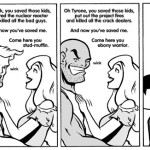Can you think of the ukulele without smiling? Unlikely. With his infectious energy, Jake thinks ‘music is the best medicine.’By LYNDA LIN, Pacific Citizen
The word “virtuoso” gets thrown around a lot in the music industry where having two octaves is considered a phenomenon, but Jake Shimabukuro inhabits every inch of that title with just a few plucks of his instrument of choice — the ukulele. Forget what you know about the little three-strand instrument traditionally played in the same strolling pace as the setting sun — Jake can make it yowl with his lightning fast hands. No, he has never actually timed the speed of his hands, but in DVD footage of a recent performance, his strumming becomes a blurry mirage against the ukulele tucked against his stomach. On his left hand, he sports a fashionable studded leather cuff. “It’s a strange thing, but it looks like it’s my right hand that works hardest, but it’s actually my left hand that’s so tight. The right is very relaxed, no tension,” said the 28-year-old Hawaiian native. “A lot of times, I go get a massage and the massage therapist says, ‘Your right side is so loose, but your left side is rock hard!’” Jake’s hands have landed his new album “Dragon” (forthcoming in the U.S. this August) in the number-one spot in Japan’s otherwise pop culture obsessed society, and also in Margaritaville alongside Jimmy Buffett. Together, they have created tropical paradise islets in cold East Coast states playing alongside each other. Talking exclusively to the Pacific Citizen from Boston where he’s currently touring with Buffett, Jake reports a little cloud coverage, but it’s nothing his ukulele (pronounced “oo-koo-LEH-leh”) and a little aloha spirit can’t clear up.
Pacific Citizen: Does your musical style jive well with Jimmy Buffett’s? Jake Shimabukuro: Jimmy is an all around great guy. His energy and vibe are so relaxing and comfortable. I still can’t say that I’m comfortable standing in front of so many people! In Pittsburgh, there were 50,000 and I was like ‘What? That’s a lot of people! Are you insane?’ (Laughs) Jimmy Buffett fans are so loving though and they embrace all the musicians. PC: Were you a Buffett fan before you toured with him? JS: Yes! My parents were so excited when they heard I was going to tour with the Jimmy Buffett band. My parents have always been very supportive of me as long as I’m happy. PC: Your mother was the first one to give you ukulele lessons. Did she teach you everything you know? JS: I definitely credit her with getting me started with the ukulele. But while I was growing up, I had a lot of instructors, so I learned in the traditional way. In high school, I listened to a lot of different music — Jimi Hendrix, Van Halen — so that opened up my eyes and ears to different kinds of sounds and I would try to mimic all the different instruments and sounds with my own ukulele. I guess you can say that led to my own contemporary style. PC: Did you always want to become a musician? JS: No! I never thought I would be a professional musician. I just thought it was a hobby … I was always really low key playing at family parties. I never thought I would be standing in front of 50,000 people! PC: How did you feel when you heard your new album was No. 1 in Japan? JS: I was so blown away. It’s such a big thing because [‘Dragon’] is self-produced … I’ve always worked with producers in the past and it was such a different experience this time because I was involved in each step. So when I got the news, I felt so proud, not for me but for the album like a parent would feel for his child (laughs).
PC: ‘Dragon’ sounds a lot different from your previous work. JS: Going from my first to my third album, each one got a little better. Listening to my own music … it’s so weird! It’s like looking at myself in the mirror (laughs) the only thing I hear are the flaws that I wish I had more time to change or I wish I could have played it better. But with [‘Dragon’] it’s like looking through a photo album. Everything I hear triggers a fun memory … I appreciate the album and the teamwork of everyone involved. PC: And you play the electric guitar! JS: It was very, very different. It was fun but I kind of wish I brought in a real guitar player (laughs). I just like the [ukulele’s] nylon string and acoustic element. The electric guitar if it’s in the right hands, can produce beautiful music, but in mine it just makes noise! PC: When you say ‘ukulele’ a lot of people think about Don Ho and the slow ballads. Do you come up against those stereotypes? JS: All the time and I think it’s great. I like that because when I’m performing, especially in the Mainland, I get really surprised looks. People expect to hear traditional Hawaiian music. I think it’s positive in the sense that I’ve had people come up to me after shows and say that they didn’t know that a ukulele could sound like that! It feels good that I help people look at the ukulele differently. PC: Do your Japanese fans treat you differently than your American fans? JS: [The Japanese fans] are so supportive. I guess it’s because I don’t live there. I only tour there twice a year … and I guess it’s because they don’t see me all the time that they come show their support. When I play Hawaii, they see me all the time, so they are more like, ‘Oh. There’s Jake.’ PC: One day, will Jimmy Buffett be playing Jake Shimabukuro’s songs? JS: Nah! (laughs) One of the greatest things for me about being part of Jimmy Buffett’s tour is that it reminds me how many great songs he’s made. It tickles me each time to hear all the great songs I grew up listening to, and thinking ‘Oh yeah I remember this one!’ I love ‘Come Monday.’ Whenever he plays it, I have to stop and listen. PC: What do you hope your fans will take away from your music? JS: My main thing is that music should be fun. When I perform I’m having a blast and I always want people to walk away smiling and feeling good. If they had a bad week, I want them to forget about their bad week. I think music is the best medicine.
|
||
|











